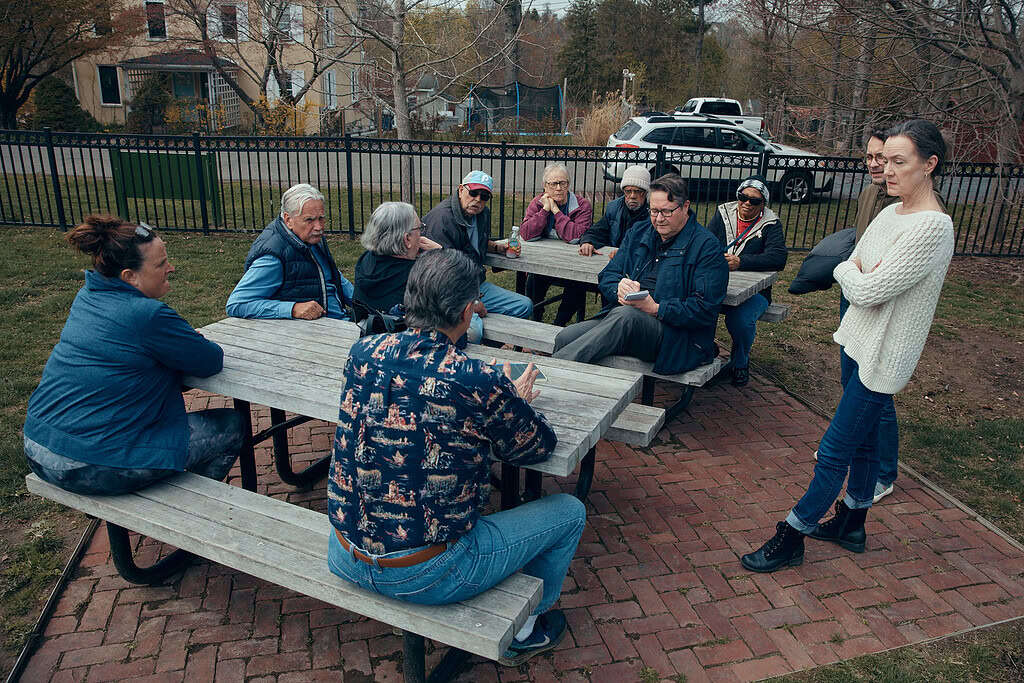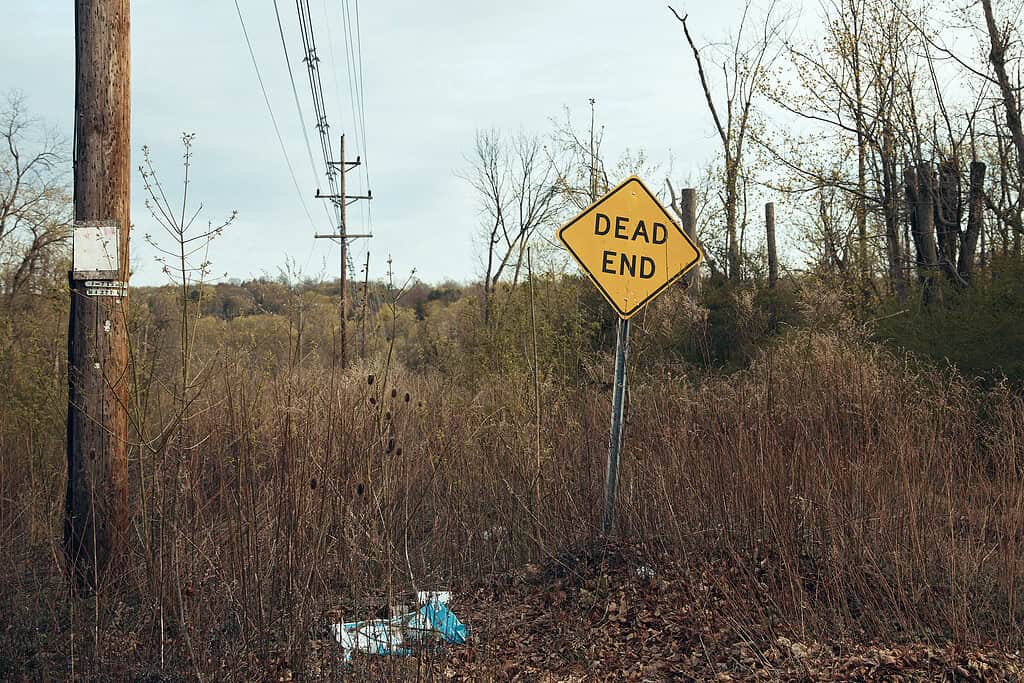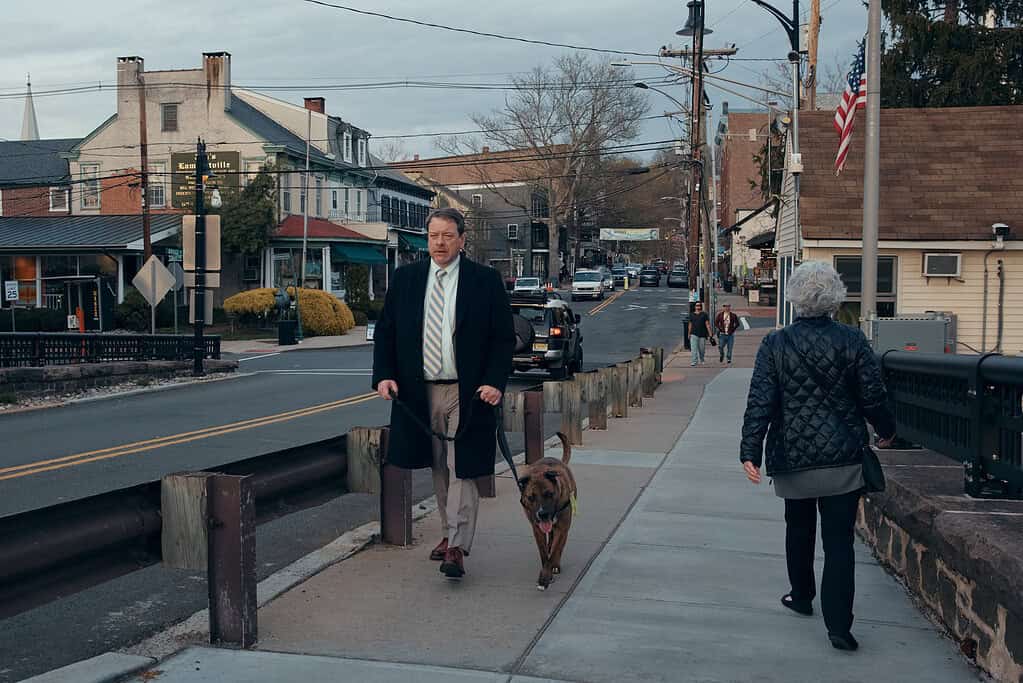In Lambertville, development and housing plans spur a backlash against mayor and recall talk

Andrew Nowick, a relative newcomer to Lambertville with little political experience, was elected mayor in 2021 by just a few dozen votes in a tough campaign against the longtime president of the town’s historical society.
But the Massachusetts native went on to quickly charm people in this quaint Delaware River community of 4,200 in western Hunterdon County.
He kept long working hours and chatted with anyone who walked through the door of his City Hall office. He rode around town on his retro red cruiser bike, handing out homemade cookies to constituents. As a married gay man with three adopted children, Nowick reflected the friendly and open vibe of a progressive town known as a haven for the LGBTQ community.
But last month, less than a year after winning reelection, Nowick is seen by many locals as the most detested man in town. Anti-Nowick signs are popping up on utility poles. There is talk of a recall petition.
Two weeks ago, dozens of residents lined up at a city council meeting to berate the mayor for what they see as his role in advancing outsized new developments, such as the 200-unit project by K. Hovnanian Homes that opponents say will unleash environmental havoc and destroy Lambertville’s quiet streetscapes.
“I don’t even believe in democracy anymore,” Hancock Street resident Heather Lee told the mayor during public comment, her voice shaking in anger. “You don’t represent me. You represent the builders … You’re going to be remembered as the Robert Moses of Lambertville.”
Susan Rovello of Hillside Court, who called into the meeting, said she was “heartbroken” by the mayor’s furtherance of the proposed developments, even as widespread opposition mounted.
“The rage you’re seeing tonight is a direct result of the way you’ve handled this,” she said. “This will devastate this town.”
Others likened Nowick to Donald Trump and compared the people of Lambertville to the refugee rabbits of Watership Down, the 1972 allegorical novel about the wages of repressive government on a peaceful society.
“Our mayor has failed us at every step,” said Beth O’Brien of Hancock Street. “One man should not determine the future of our town. Yet, here we are.”
Several members of the Lambertville Council, seated next to Nowick, joined in chastising him and apologized to the public for their role in promoting a controversial housing development.
“We should have done more, sooner,” Councilman Steve Stegman acknowledged.
“I share everyone’s frustration that the mayor doesn’t listen,” said Councilwoman Karen Kominsky, a former state government official and a professional planner.
“My main question to you is why did you even run for mayor,” said a tearful Karen Atwood, a resident of Lambertville’s Connaught Hill neighborhood. “It seems like you don’t listen to what we say. It’s kind of like your way and that’s it.”

Nowick initially told Atwood that he didn’t want to get involved in a public “back and forth,” but would be glad to speak with her privately after the meeting. Pressed for an answer, he eventually responded.
“I ran for mayor because I thought I could do a decent job,” he said. “I show up every day at City Hall at 8 and work until 4 or 5, and I also work on weekends. My life has worked out very well … My husband and I have enjoyed a measure of success. We’ve brought up three children, and this was a way for me to express my gratitude.”
Nowick, in an interview with The Jersey Vindicator on Wednesday, reiterated that he cares deeply for the community’s concerns, but said he would not respond to “ad hominem” attacks. Asked if he thinks the public response singling him out was unfair, he declined to comment, but noted that the city council joined him in advancing the controversial Hovnanian proposal.
“I don’t really want to tackle that question, but this has been a five-person process from the beginning,” he said, adding that all official votes on the project were unanimous.
“I really believe it doesn’t do any good to engage in public arguments,” he said. “I will continue to work patiently every day.”
In the past, Nowick has also defended his work on unpopular proposals such as the Hovnanian project and a plan to redevelop part of the town’s historic canal corridor into a wedding and conference center with a multistory parking garage.
He argues that his town’s hands are tied by the mandate to create affordable housing and the legal rights of property owners and developers.
Public records confirm that the mayor’s negotiations with Hovnanian were backed by the town council, which blessed initial plans to develop a steeply sloped and wooded tract in the Connaught Hill neighborhood that once housed Lambertville High School and the city dump.
The hill, a warren of mostly older homes and cottages, was once home to itinerant workers and other poor minority families. It remains a largely working-class, isolated neighborhood of narrow and twisty streets that stands in contrast to the picket-fence array of homes and shops along the river below.
Last year, Connaught Hill’s quiet profile was shattered when high levels of hazardous PFAS chemicals began showing up in well water used by residents there. By this spring, contaminants were confirmed in 71 of 74 wells tested on the hill and adjacent areas, including neighboring West Amwell Township.

Initial data collected by private firms and state environmental regulators suggest that the hazardous chemicals may be connected to an old machine shop that used Teflon, or to the city dump — closed now for some 50 years but never remediated or capped.
All Connaught Hill residents have been forced to install water filtration systems in their homes. Many have filed tort claim notices informing town officials that they may sue the municipality and any responsible parties for damages, as cases of cancer and other maladies linked to PFAS mount in the neighborhood.
Anger against Nowick rose quickly in recent months as news of the contamination surfaced. Residents were particularly incensed by what they said was his resistance to notifying the state about the discovery. That task fell to the mayor of West Amwell, who also found tainted well water at his Connaught Hill home.
Despite the discovery of the environmental hazards, Lambertville officials initially declined to withdraw their support for the Hovnanian project. Eventually, however, the council voted to rescind its development plan for Connaught Hill, citing the contamination and acknowledging concerns about traffic and water runoff.
Hovnanian went to court, seeking to end Lambertville’s exemption from lawsuits under state affordable housing laws. The homebuilder argued that Lambertville officials and professional consultants had found the Connaught Hill site “suitable for development” despite the environmental issues and other potential drawbacks.
On July 7, a Superior Court judge agreed with Hovnanian in a curt opinion that underscored the weakness of Lambertville’s legal position.
Residents were irate, even accusing Nowick of deliberately engineering the stinging court defeat. As a result of the ruling, Lambertville is now open to so-called builder’s remedy suits and has lost some ability to control its own development destiny.
The Hovnanian project would bring up to 40 affordable units that could be built on or near contaminated areas on Connaught Hill. Critics say it will also worsen Lambertville’s increasing tendency to flood and clog the hill’s tight byways while raising the population of Lambertville by an estimated 15 percent.

Residents of affordable houses on Connaught Hill would be deeply isolated from the town’s business district and transit connections, critics point out.
“It’s a real tragedy not just for the hill but for the entire city of Lambertville,” said longtime resident Jeff Tittel, a former head of the New Jersey Sierra Club who has complained bitterly about private meetings between Nowick and the builder in which development plans for the hill were discussed.
Nowick has argued that he had the legal responsibility to keep those sessions closed. He declined to comment on any legal issues surrounding Hovnanian, other than saying Lambertville would follow all court mandates.
“We all saw this coming,” Tittel said. “But the mayor kept refusing to tell the public what was happening. I never dreamed I would see authoritarian rule in this town, but here we are in Trump land.”
Jeff Pillets is a freelance journalist whose stories have been featured by ProPublica, New Jersey Spotlight News, WNYC-New York Public Radio and The Record. He was named a Pulitzer Prize finalist in 2008 for stories on waste and abuse in New Jersey state government. Contact jeffpillets AT icloud.com.



